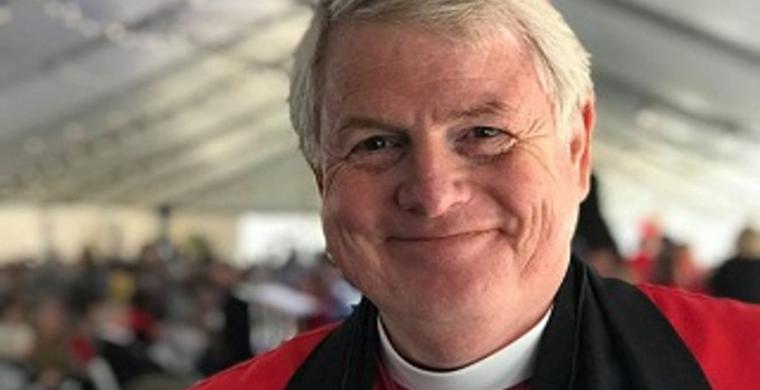GEORGIA: Bishop Benhase to bow out. Cites health concerns
Church not evangelizing and faces tremendous headwinds
Decade of Evangelism appears to be a total flop
By David W. Virtue, DD
www.virtueonline.org
November 11, 2018
The Bishop of Georgia, Scott Anson Benhase, 61, is resigning as bishop of his diocese, citing unspecified "significant health setbacks". He is calling for an election Nov. 15-16 2019, with the consecration and installation to take place May 30, 2020.
In a letter to the Diocese of Georgia, the moderately liberal bishop publicly admitted that all is not well, not only in his own diocese, but in the broader Episcopal Church. Here is what he wrote:
"When bishops make an announcement such as this, the usual script they follow is to say how wonderfully healthy the diocese now is, how leaving when things are going so well is for the best, and then the bishop subtly works in all sorts of backdoor compliments for all the great things he thinks he's done. I won't insult your intelligence by doing that, nor will I subject you to what we all know to be at best half-truths. The truth is we're facing tremendous headwinds as a Church and, as of yet, we've not done what we need to do to adequately address them. We aren't evangelizing as we must and our stewardship isn't strong enough to be sustaining in the long-term."
A rare honest moment for a bishop who once said this; "The unmerited grace of the Gospel of Jesus is the only medicine that can cure this socio-economic disease. That Gospel tells us that we're not valued for what we produce. We're valued because God graced humanity in Jesus and the imputed righteousness of his cross declares we all have infinite worth. But such a Gospel can only be taught by a church that sees our "performacist" culture clearly. And our culture is literally killing us."
Or this in a paper he wrote, Bad Theology Worsens Opioid Crisis: "The Church's theology has told us for centuries that all humanity is sinful; that we lack the willpower, in and of ourselves, to avoid sin. We have a collect in our tradition that tells us that "we have no power in ourselves to help ourselves." Truer words were never written. Thus, we're literally "bound" to sin. We don't have complete "free will." Sin working in us will always distort our freedom as well as our ability to regularly choose what's good for us. So, theologically, the claim that people can just will their way to beat addiction is false. God's mercy is the only power that can help us. And God's power comes, not from inside of us, but from the grace imputed to us in Jesus."
His voting record on hot button issues reveals a certain theological schizophrenia. In 2012 He voted NO on A049 which authorized Liturgical Resources for Blessing Same-Gender Relationships.
In 2015 he ABSTAINED on A036, on the Celebration and Blessing of Same-Sex Marriage, but said presbyters were free to provide such blessings without vestry endorsement if they were to be offered elsewhere. "My rationale for maintaining such endorsement is the basic reality that faithful people can and will come to different conclusions about the Church's role in blessing same sex marriages. However, creating divisions among clergy and lay leadership in a congregation serves no useful purpose for God's mission."
There was not a roll call vote in 2018 on B012. It was an overwhelming voice vote. But it is thought he voted yes on this resolution. Benhase is not a Communion Partner bishop.
But that is not how Benhase started out. Born and raised along the Ohio River, he was the son of a football coach and football was the center of his life. His faith life was formed primarily through the Fellowship of Christian Athletes, an evangelical ministry to athletes. He started out much like John Shelby Spong who also began as evangelical and later abandoned it; Benhase never renounced it, but it clearly never fully took hold.
When Benhase took over as bishop of the diocese in 2010, the Baptized Membership was 16,895. By 2017, it had dropped to 14,680, a loss of 2,215 or 13.1%. Communicants for the same period went from 13,760 to 11,334, a loss of 2,726 or 17.6%.
Average Sunday Attendance in 2010 was 6,380; by 2017, it had dropped to 5,689, a loss of 691 or 10.8%.
The percentage of Baptisms in 2010 was 273; by 2017, it was 135. Confirmations dropped from 242 to 166 for the same period. There were fewer converts for that period and marriages plummeted from 94 to 77, reflecting more a national trend than a diocesan one.
Funerals, now the major numerical indicator of national parish health went from 281 in 2010 to 263 in 2017.
In 2010, congregations numbered 71; in 2017, congregations numbered 68, a loss of three or 4.5%.
His diocese reflected the national decline in nearly all dioceses, but not as badly as some.
Perhaps he will come to realize, as did those who left the Episcopal Church for the Anglican Church in North America, that God is not mocked, and that his diocese is reaping what it has sown. He is leaving a diocese and church that betrayed the Lord, and in the words of the late Presiding Bishop John Allin, "I loved the church more than I loved the Lord of the church."
END














